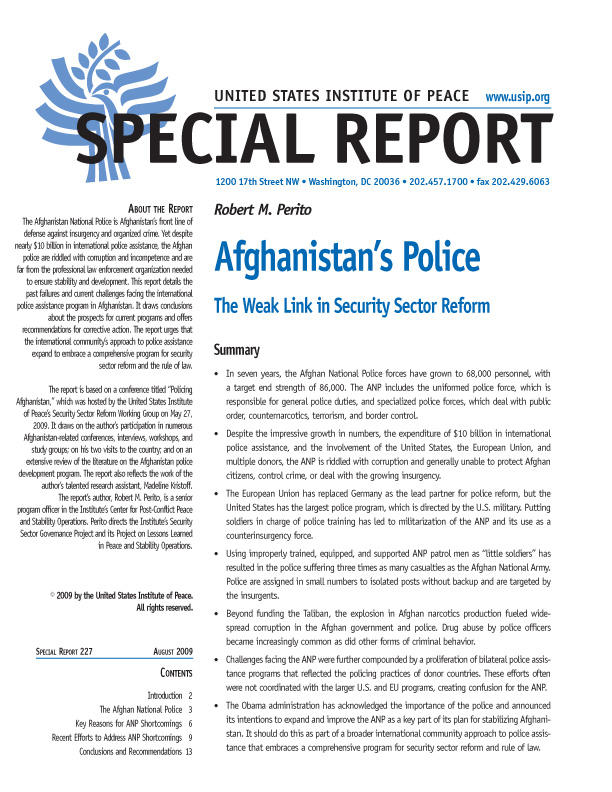
Summary
- In seven years, the Afghan National Police forces have grown to 68,000 personnel, with a target end strength of 86,000. The ANP includes the uniformed police force, which is responsible for general police duties, and specialized police forces, which deal with public order, counternarcotics, terrorism, and border control.
- Despite the impressive growth in numbers, the expenditure of $10 billion in international police assistance, and the involvement of the United States, the European Union, and multiple donors, the ANP is riddled with corruption and generally unable to protect Afghan citizens, control crime, or deal with the growing insurgency.
- The European Union has replaced Germany as the lead partner for police reform, but the United States has the largest police program, which is directed by the U.S. military. Putting soldiers in charge of police training has led to militarization of the ANP and its use as a counterinsurgency force.
- Using improperly trained, equipped, and supported ANP patrol men as "little soldiers" has resulted in the police suffering three times as many casualties as the Afghan National Army. Police are assigned in small numbers to isolated posts without backup and are targeted by the insurgents.
- Beyond funding the Taliban, the explosion in Afghan narcotics production fueled widespread corruption in the Afghan government and police. Drug abuse by police officers became increasingly common as did other forms of criminal behavior.
- Challenges facing the ANP were further compounded by a proliferation of bilateral police assistance programs that reflected the policing practices of donor countries. These efforts often were not coordinated with the larger U.S. and EU programs, creating confusion for the ANP.
- The Obama administration has acknowledged the importance of the police and announced its intentions to expand and improve the ANP as a key part of its plan for stabilizing Afghanistan. It should do this as part of a broader international community approach to police assistance that embraces a comprehensive program for security sector reform and rule of law.
About the Report
The Afghanistan National Police is Afghanistan's front line of defense against insurgency and organized crime. Yet despite nearly $10 billion in international police assistance, the Afghan police are riddled with corruption and incompetence and are far from the professional law enforcement organization needed to ensure stability and development. This report details the past failures and current challenges facing the international police assistance program in Afghanistan. It draws conclusions about the prospects for current programs and offers recommendations for corrective action. The report urges that the international community’s approach to police assistance expand to embrace a comprehensive program for security sector reform and the rule of law.
The report is based on a conference titled "Policing Afghanistan," which was hosted by the United States Institute of Peace's Security Sector Reform Working Group on May 27, 2009. It draws on the author's participation in numerous Afghanistan-related conferences, interviews, workshops, and study groups; on his two visits to the country; and on an extensive review of the literature on the Afghanistan police development program. The report also reflects the work of the author's talented research assistant, Madeline Kristoff. The report's author, Robert M. Perito, is a senior program officer in the Institute's Center for Post-Conflict Peace and Stability Operations. Perito directs the Institute's Security Sector Governance Initiative, and its Project on Lessons Learned in Peace and Stability Operations.